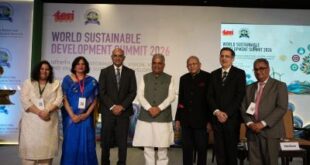Bengaluru, 27th February, 2024: Bharat Petroleum Corporation Limited (BPCL), a leading Fortune 500 Maharatna Energy Conglomerate, in collaboration with the Ministry of Petroleum & Natural Gas and GAIL, hosted a comprehensive workshop aimed at advancing the adoption of Compressed Biogas (CBG) as a sustainable energy solution. The event took place on 26th February, 2024 at the Renaissance Bengaluru Race Course Hotel in Bengaluru, Karnataka.
The workshop, held under the initiative of the Ministry of Petroleum & Natural Gas, facilitated open dialogue among stakeholders, including bank officials, CBG producers, entrepreneurs, technology providers, and representatives from various organizations such as the World Bank, Indian Biogas Association, and Oil and Gas marketing companies. The discussions centered around the pivotal role of CBG in India’s energy transition, emphasizing its significance as a green fuel and its contribution to the SATAT (Sustainable Alternative Towards Affordable Transportation) initiative.
The workshop will be followed by a visit to a CBG plant scheduled for today, February 27, 2024, providing participants with firsthand experience and insights into CBG production processes. This hands-on approach aimed to further enhance understanding and collaboration in the CBG sector.
Shri Anurag Saraogi, CGM Biofuels, BPCL, mentioned in his speech “In our pursuit of a cleaner, greener future, today’s workshop in Bangalore, hosted by BPCL under the Ministry of Petroleum & Natural Gas, is pivotal. We’re sensitizing bank officials about financing Compressed Biogas (CBG) projects, vital for advancing sustainable energy solutions. Through insightful discussions, we aim to deepen their understanding of CBG’s potential. CBG, with properties similar to CNG, holds promise in replacing it across sectors. With abundant organic waste, scaling up CBG production is crucial for a cleaner future. This workshop serves as a crucial platform to explore these opportunities. Together, we’re committed to driving positive change and embracing sustainable energy solutions.”
Shri Arun Kumar, Director of the Ministry of Petroleum & Natural Gas, highlighted the critical importance of CBG in achieving net-zero emissions by 2070, underscoring the government’s commitment to sustainable energy solutions. The workshop delved into key aspects of CBG projects, including financing, technical evaluation, financial modeling, and best practices in project implementation.
In his keynote address, Shri Ramesh Krishna, Under Secretary of the Ministry of Petroleum & Natural Gas, emphasized India’s strategic vision for sustainable energy solutions and the pivotal role of Compressed Biogas (CBG) in achieving these objectives. Highlighting the government’s commitment to environmental stewardship, Shri Krishna reiterated Prime Minister Shri Narendra Modi’s five-fold commitment towards climate action, including ambitious targets for non-fossil energy capacity and carbon emissions reduction. The workshop served as a crucial platform to align stakeholders with these national priorities, fostering collaboration and innovation to propel the CBG sector forward. Shri Krishna urged participants to actively engage in discussions and contribute their expertise to address challenges and seize opportunities in advancing CBG projects across the country.
Distinguished speakers at the event included Shri Ramesh Krishna, Under Secretary of the Ministry of Petroleum & Natural Gas; Mr. Vibhor Srivastava, MoPNG; Mr. Bikas, Scientist from MNRE; and Mr. Subhashish Parida, DDWS. Additionally, Shri Anurag Saraogi, CGM Biofuels, BPCL, and Shri Anoop Taneja, State Head, Karnataka Retail, BPCL, were present along with their team members, showcasing BPCL’s commitment to advancing sustainable energy solutions.
The event served as a platform for fruitful discussions, exchange of insights, and collaboration opportunities to accelerate the adoption and utilization of CBG as a sustainable energy source in India. BPCL remains dedicated to supporting initiatives that promote environmental sustainability and energy security.
 Newspatrolling.com News cum Content Syndication Portal Online
Newspatrolling.com News cum Content Syndication Portal Online






